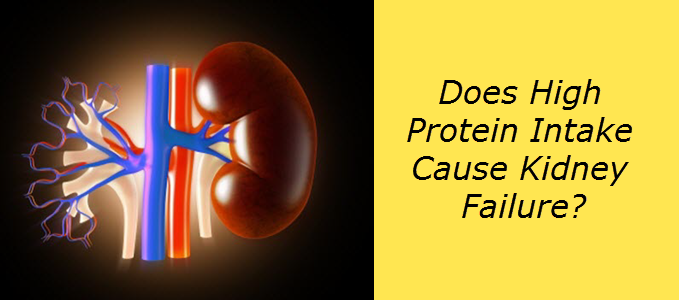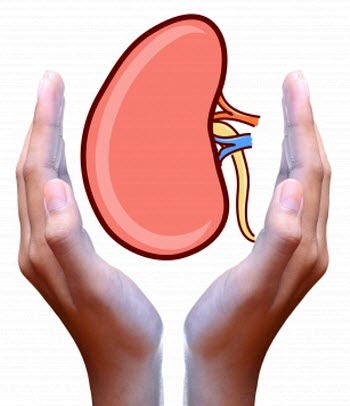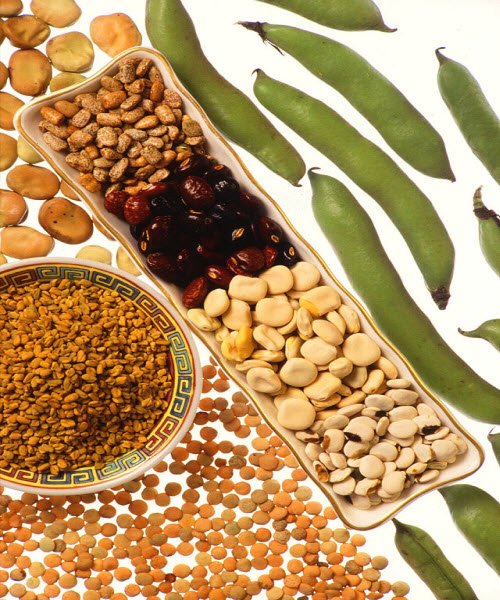Does High Protein Intake Cause Kidney Failure?
(Src)
Does High Protein Intake Cause Kidney Failure?
The role of protein in muscle repair and development is evident. Our body metabolizes a large amount of protein throughout a day. Some research claims that excess amount of protein metabolism can affect the kidney function.
So far, there is no direct relation to excess protein intake and kidney damage. However, there are few hypothesis that points out the effect of excess protein on kidney function.
Important role of Protein
Some important role of protein in our body includes
- Make hormones
- Repair and heal tissues
- Produce antibodies and enzymes
- Fluid and electrolytes balance
Foods high in protein includes eggs, chicken, cottage cheese, milk, peanuts, etc.
In what ways an excess protein can affect kidney function?
(Src)
Metabolism of protein in our body produces some toxic element like ketones as a byproduct. Most of the time, ketones are eliminated by the kidneys. But sometimes they are left behind. These ketones can hamper the kidney function. It can also cause other complications such as dehydration, dizziness, fatigue, heart palpitations, and bad breath. Let see on what basis this is concluded.
The Kidney function is measured by Glomerular Filtration Rate ( GFR). It determines how well the kidney is working or filtering the blood. Research have shown that excess protein filtration can affect the GFR rates. Also known as hyperfiltration. Over the long term, hyperfiltration may lead to acute renal failure.
CKD (Chronic Kidney Disease)
(Src)
The various Scientific report indicates that restriction of dietary protein in CKD patient can reduce albuminuria (albumin protein found in urine) and uraemic symptoms. Here are some CKD diseases that is closely related to the dietary protein intake.
- Proteinuria
When kidneys are not functioning well, they cannot filter protein properly. This results in the excess of protein expelled out in the urine. This is known as proteinuria. Small amounts of protein in urine are normal, but the high protein in urine indicate the early symptoms of kidney failure. It is observed that diet restricted in protein develop less severe renal lesions and less proteinuria. Excess dietary protein intake can also affect albumin homeostasis in the nephrotic patient.
- Kidney Stones
Protein intake in excess increases the excretion of potentially lithogenic substances such as calcium and uric acid. These substances get accumulated in kidney and ultimately forms kidney stones. To avoid kidney stones, a diet low in calcium and high in fluids is recommended. While a diet low in carbohydrates and high in protein should be avoided. It can affect the ability of the body to absorb calcium.
- Glomeruli Nephritis
During Glomeruli Nephritis, kidneys become inflamed and cause kidney pain. It passes a lot of proteins and blood into the urine. Glomerulonephritis often occurs followed by Nephrotic syndrome.
How much protein do I need?
For adult man and women
The daily protein intake in men is about 56 grams. In women, it is 46 grams per day.
- CKD patient
Patient with CKD (Chronic Kidney Disease) also needs protein. Knowing the risk, the amount must be carefully administered. The standard intake of protein among CKD patients is about 0.8-1 gm of protein per kg of an ideal body weight. CKD patient should keep blood pressure in control, for a healthy kidney.
CKD patient should have low protein, phosphate, sodium, potassium, and calcium in their diet.
Symptoms of Kidney Disease
No clear sign of kidney failure appears unless it becomes severe. This is the hard part of kidney failure. Kidney failure is the end stage of Kidney disease. Here is how kidney disease progresses.
| Different Stages | Complications of Kidney Disease |
| Stage 1 | Kidney damage with Normal GFR rate- Protein in Urine |
| Stage 2 | Kidney damage with mild decrease in GFR rate |
| Stage 3 | Moderate decrease in GFR |
| Stage 4 | Severe reduction in GFR rate |
| Stage 5 | Kidney Failure |
It is always better to do a kidney test if any of the following symptoms are manifested.
Following are some kidney failure symptoms or renal disease symptoms.
- Swollen feet/ankles
- Frequent urination, especially late at night
- Trouble sleeping
- Foamy urine
- Muscle cramping
- Puffiness around the eyes in the morning
- Vomiting
- Changes in urine output
- Anemia (a decrease in red blood cells)
- Sudden rise in potassium levels (hyperkalemia)
- Fluid retention
- Nausea
Risk factor to Acute Kidney Failure
So, what cause kidney failure? Reduce blood flow to the kidney can cause renal failure. There are many other causes of kidney failure.
The risk factors associated with Acute Kidney Failure are
- High blood pressure
- Dehydration
- Hemorrhage
- Septic shock
- Hemolytic uremic syndrome
- Idiopathic thrombocytopenic thrombotic purpura
- High blood sugar
- Urinary Infection
Vegan Protein Vs Meat Protein
The effect of vegetarian protein and non-vegetarian protein on kidney are more or less the same. However, some studies have postulated that meat protein causes dynamic effects on renal function. Also, meat protein exhibits the highest excretion of undissociated uric acid. It is responsible for a kidney stone. Thus consuming high protein vegetables and restriction to the animal protein can lower kidney stone risk.
Some good source of plant based protein includes,
- Soy protein
- Peas
- Lentils
- Quinoa (gluten free grain)
- Black Beans
- Hemp Seeds
- Spirulina
- Tofu
Tips to keep Kidney Healthy:
- Keep blood pressure and cholesterol level under control
- Don’t overuse painkillers like NSAIDs (Aspirin, Ibuprofen, Tylenol, etc.)
- Avoid alcohol and smoking
- Control your weight and exercise regularly
- Maintain a healthy fluid intake, especially during hot weather. Six glasses a day
- Take expert advice before reducing carbohydrate intake and increasing protein intake
- Lower phosphorous contain from the food. Avoid eating processed food.
- Control sugar level if you are diabetic
- Consult your doctor before taking multivitamins supplements
- Include berries, apples, garlic, olive oil and fish in your diet
- Some inexperienced doctors put patients of proteinuria on high protein diets. Thinking that it will compensate the amount of protein they lost. But it actually does more damage to the kidneys
Besides above tips for a healthy kidney. An individual must go through kidney test at regular interval. Especially, those who are on high protein diets.






